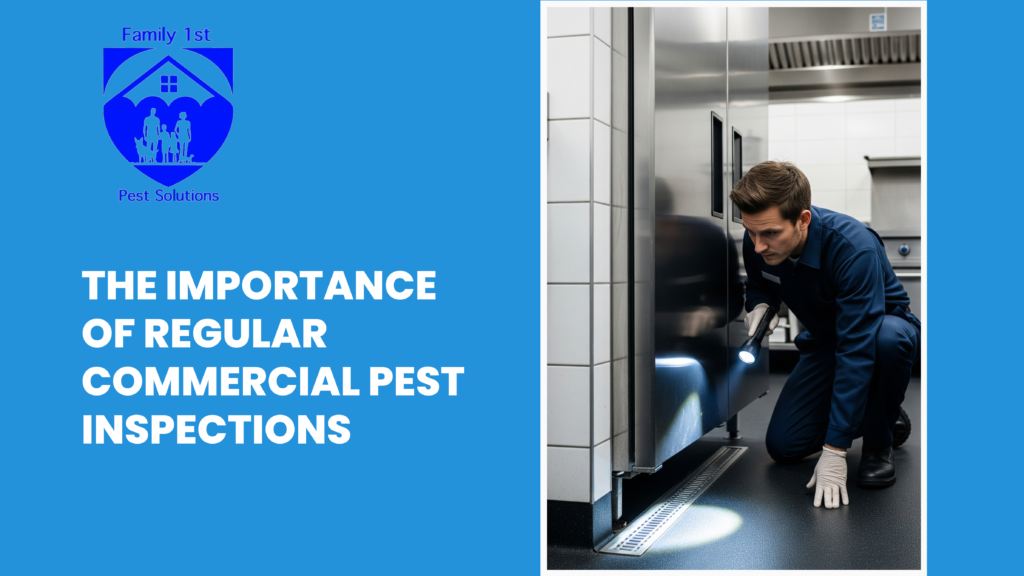Introduction
Pests are more than a nuisance; they’re a liability. Whether you manage a restaurant, warehouse, office building, or retail store, regular commercial pest inspections are essential to maintaining a clean, safe, and compliant business environment. By identifying issues before they spiral out of control, you can avoid hefty fines, health risks, and reputational damage.
Why Pest Inspections Are Crucial for Commercial Properties
1. Health and Safety Compliance
Government regulations require businesses, especially those in foodservice, healthcare, and hospitality, to maintain pest-free environments. Failure to do so can lead to:
- Hefty fines
- Temporary or permanent closure
- Negative health department ratings
Pests like rodents, cockroaches, and flies carry harmful pathogens, contaminating surfaces and food, posing risks to staff and customers.
2. Protecting Brand Reputation
Word spreads fast. A single online review or social media post showing a rodent or cockroach in your establishment can cost you customers and credibility.
Regular inspections help identify hidden infestations before customers notice, and before your business ends up in the spotlight for the wrong reasons.
What Do Commercial Pest Inspections Include?
A professional pest inspection service will typically:
- Survey the entire property, including break rooms, kitchens, basements, attics, walls, HVAC systems, and storage areas.
- Identify signs of pest activity such as droppings, nests, or chew marks.
- Evaluate access points like cracks, gaps, or vents.
- Recommend preventative measures and schedule future treatments if needed.
Industries That Must Prioritize Pest Inspections
While every business should care about pest control, the following industries face higher risk and stricter regulations:
● Restaurants & Food Processing
- High foot traffic, food storage, and warmth attract pests.
- Even minor infestations can result in failing a health inspection.
● Healthcare Facilities
- Pests pose serious threats to patients with compromised immune systems.
- Strict sanitation protocols mean inspections are not optional.
● Warehouses & Storage Units
- Rodents and insects can damage packaging, chew through materials, and ruin inventory.
● Hotels & Hospitality
- Cleanliness is directly tied to guest experience and reviews.
- Bed bugs and cockroaches are particularly damaging in this sector.
Benefits of Regular Commercial Pest Inspections
Early Detection of Infestations
Routine inspections catch signs of infestations before they grow, allowing for faster and more cost-effective treatment.
Prevention of Property Damage
Rodents and termites can chew through wood, wiring, and insulation. Left unchecked, the repair costs could run into thousands.
Regulatory Compliance
Pest inspections help you stay compliant with local, state, and federal health and safety codes, avoiding fines or legal consequences.
Peace of Mind
When you know your property is pest-free, you can focus on growing your business instead of worrying about the next inspection or surprise pest sighting.
How Often Should Commercial Properties Be Inspected?
The frequency depends on several factors:
- Type of business (food-related businesses should inspect monthly or quarterly)
- Property size and age
- Surrounding environment (urban vs. rural, proximity to water or wooded areas)
Best Practice: Schedule a professional inspection every 3 months at a minimum. High-risk industries should inspect monthly.
Common Pests Found in Commercial Properties
- Rodents (rats and mice): Known for chewing wires, spreading disease.
- Cockroaches: Thrive in warm, damp environments; hard to eliminate once settled.
- Flies: Quick to infest and contaminate food surfaces.
- Termites: Silent destroyers of wood and building structures.
- Ants: Difficult to fully remove without targeting colonies.
Each of these pests requires a different control method, making professional inspections even more critical.
DIY Signs to Watch Between Inspections
While professional inspections are essential, staff should be trained to recognize signs of pest activity, including:
- Droppings near food or trash
- Unusual odors (especially in kitchens or restrooms)
- Chewed boxes or furniture
- Nesting materials like shredded paper
- Dead insects near entry points
Provide training materials or signage to encourage staff participation in pest prevention.
Choosing a Commercial Pest Inspection Provider
When selecting a pest control partner, look for:
- Proper licensing and certification
- Experience with your specific industry
- Clear inspection reports with action plans
- Eco-friendly or low-toxicity treatment options
Bonus Tip: Opt for companies offering long-term maintenance plans and emergency pest response services.
Final Thoughts: Protect Your Business with Proactive Inspections
In today’s competitive business landscape, proactive pest control isn’t a luxury; it’s a necessity. Regular commercial pest inspections help you:
- Stay compliant
- Avoid costly infestations
- Maintain your reputation
- Protect your employees and customers
Don’t wait until pests cause damage or drive away business. Schedule your next inspection today and ensure your commercial space is clean, safe, and thriving.

